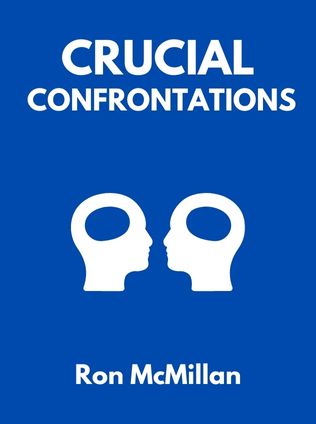
Crucial Confrontations
Tools for Resolving Broken Promises, Violated Expectations, and Bad Behavior
By Ron McMillan,
Published 08/2004
About the Authors
Kerry Patterson is a renowned consultant who has worked with numerous Fortune 500 companies, leveraging his award-winning training programs to improve organizational communication. Alongside him, Joseph Grenny, with over 20 years of experience in coaching corporate leaders, has significantly contributed to the art of effective communication. Ron McMillan co-founded the Covey Leadership Center and serves as its VP of Research and Development, bringing extensive expertise in leadership and training. Al Switzler, a faculty member at the University of Michigan's Executive Development Center, combines academic knowledge with practical insights, making the team behind "Crucial Confrontations" exceptionally well-rounded.
Main Idea
Behind the problems that regularly plague families, teams, and organizations are individuals who either can't or won't deal with failed promises. The reason is that they're afraid to talk face-to-face about difficult but important issues. This fear of confrontation prevents them from resolving these issues, causing simple problems to grow into chronic ones. By learning how to deal with challenging confrontations, individuals can avoid the typical, unconstructive responses of slipping into either awkward silence or embarrassing violence. Mastering crucial confrontations requires a specific skill set. In "Crucial Confrontations," the authors guide readers in developing the skills needed to resolve the most pressing problems, including quality violations, safety infractions, cost-cutting mistakes, and medical errors. Their research indicates that most organizations lose between 20 and 80 percent of their potential performance because they haven't mastered crucial confrontations. The skills can be learned, and the authors show you how.
Table of Contents
- What's a Crucial Confrontation?
- What to Do Before a Crucial Confrontation
- Master My Stories
- What to Do During a Crucial Confrontation
- Describe the Gap
- Make it Motivating
- Make it Easy
- Stay Focused and Flexible
- What to Do After a Crucial Confrontation
- The 'Yeah-Buts'
What's a Crucial Confrontation?
Sarah, the head nurse at Pine Valley Medical Center in northwestern Washington, stands frozen as doctors discuss the treatment of an elderly patient. Years of experience have taught Sarah two things: One, the patient probably needed an immediate and large dose of antibiotics; and two, even though the doctors were discussing a treatment that didn't involve antibiotics, Sarah would keep her mouth shut. Years earlier, fresh out of college, Sarah had cheerfully disagreed with the three doctors she had been assisting. They stopped dead in their tracks and looked at her as if she were a cockroach on a wedding cake. In one poignant moment, the rules had been made clear to Sarah: Don't disagree with a physician—ever. Now, nearly two decades and hundreds of confirming incidents later, she stands by wondering: Will the doctors do what I believe they should do, or will they come to the same conclusion too late? She doesn't wonder if she should speak up.
Sarah's expectations weren't met, and in response, she has resorted to silence. Silence and Violence: Staring into the face of a possible disaster, some people are caught in agonizing silence. Rather than speak directly and frankly about the problem at hand, they drop hints, change the subject, or actually withdraw from the interaction altogether. Fear drives them to various forms of silence, and their point of view is never heard—except maybe as gossip or rumor. Others break away from their tortured inaction only to slip into violence. Frightened at the thought of not being heard, they try to force their ideas on others. They cut people off, overstate arguments, attack ideas, employ harsh debate tactics, and eventually resort to insults and threats. Fear drives them to do violence to the discussion, and their ideas are often resisted.
“We all face crucial confrontations. We set clear expectations, but the other person doesn't live up to them—we feel disappointed.” — Patterson, Grenny, McMillan, Switzler
Mastering crucial confrontations allows you to deal with failed promises, disappointments, and other performance gaps. If you can't effectively confront violated expectations, you will eventually experience massive personal, social, and organizational consequences. Productivity will run at half of what it should be. If you learn how to hold people accountable in a way that solves problems without causing new ones, you can look forward to significant and lasting change. When you confront, you hold someone accountable, face-to-face. When handled correctly, both parties are candid, open, honest, and respectful. As a result, problems are resolved and relationships benefit. Crucial confrontation skills offer the best chance to succeed—no matter the topic, person, or circumstance.
What to Do Before a Crucial Confrontation
Problems that require a confrontation with another person often leave us with two questions: WHAT and IF. First, what violation or violations do you actually address? How do you dismantle a bundle of problems into its component parts and choose the one you want to confront? Second, you have to decide if you're actually going to say anything. Do you speak up and run the risk of causing new problems, or do you remain silent and run the risk of never solving the problem?
Sign up for FREE and get access to 1,400+ books summaries.
You May Also Like
The Subtle Art of Not Giving a F*ck
A Counterintuitive Approach to Living a Good Life
By Mark MansonRich Dad Poor Dad
What the Rich Teach Their Kids About Money - That the Poor and Middle Class Do Not!
By Robert T. KiyosakiHow To Win Friends and Influence People
The All-Time Classic Manual Of People Skills
By Dale CarnegieQuiet: The Power of Introverts
The Power of Introverts in a World That Can't Stop Talking
By Susan Cain



















